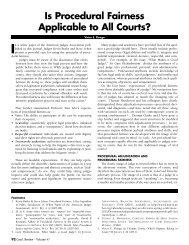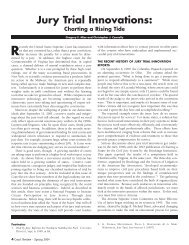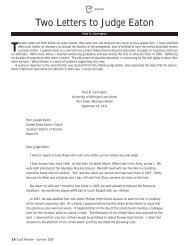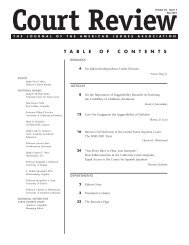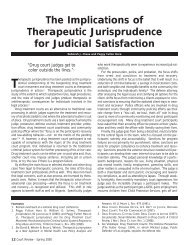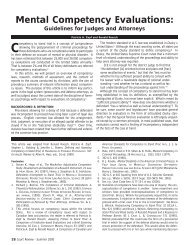Special Issue on Procedural Fairness - American Judges Association
Special Issue on Procedural Fairness - American Judges Association
Special Issue on Procedural Fairness - American Judges Association
- No tags were found...
Create successful ePaper yourself
Turn your PDF publications into a flip-book with our unique Google optimized e-Paper software.
The Percepti<strong>on</strong>s ofSelf-Represented Tenants in aCommunity-Based Housing CourtRashida Abuwala & D<strong>on</strong>ald J. FaroleI. INTRODUCTIONThis study examines the impact of Harlem CommunityJustice Center, a community-based housing court thatattempts to achieve speedier and more durable outcomes inlandlord-tenant disputes. However, it may be particularly beneficialto pro se litigants (i.e., those who represent themselveswithout an attorney). In New York City, most landlords arerepresented, while the vast majority of tenants are not. In fact,<strong>on</strong>e report notes that <strong>on</strong>ly 12% of tenants are able to affordcounsel while 98% of landlords are represented. 1The primary objective of this study was to examine theexperiences of pro se tenants whose cases are heard in Harlem,surveying their percepti<strong>on</strong>s of the fairness, accessibility, timeliness,respectfulness, and comprehensibility of the courtprocess. We c<strong>on</strong>ducted a survey of pro se tenants both inHarlem and in New York City’s centralized housing courtlocated in southern Manhattan (hereinafter referred to as“downtown housing court”). Survey results were supplementedwith structured court observati<strong>on</strong>s, also c<strong>on</strong>ducted atboth locati<strong>on</strong>s.BACKGROUNDThe vast majority of housing court cases in New York Cityare filed by landlords to evict tenants for n<strong>on</strong>payment of rent.These tenants are often hampered by their inability to navigatethe complexities of the legal system. Unable to afford legal representati<strong>on</strong>,often unaware of their rights and resp<strong>on</strong>sibilities,and afraid of losing their apartments, many tenants must filetheir own pleadings and resp<strong>on</strong>ses to pleadings in court—anintimidating and complex process. These problems are compoundedby the high-volume of housing court cases such asNew York City’s, which hears more than 300,000 cases annually.2 According to <strong>on</strong>e descripti<strong>on</strong>: “housing court, with itsunruly atmosphere of lawyers and tenants negotiating in thehallways or yelling into cell ph<strong>on</strong>es, can be overwhelming . . .the hearings before some of the most overworked judges in thesystem are usually brief, so litigants often have but a few minutesto recount their emoti<strong>on</strong>al slide into debt.” 3Recently, community-based models have emerged whichoffer alternative approaches to resolving housing cases in NewYork City, as well as the possibility of enhanced access to justicefor pro se litigants. Community courts hearing housingcases were opened in Harlem and Red Hook, Brooklyn.Opened in May 2001, the Harlem Community Justice Centeris located in East Harlem and handles all housing court casesfrom two Harlem zip codes (10035 and 10037). All otherhousing cases in Manhattan are heard at the centralized housingcourt.The Harlem Community Justice Center seeks to addressmany of the underlying problems that give rise to housingcases. The court is staffed by a single judge and handles cases<strong>on</strong>ly from a limited geographic area. It also seeks to providethe judge with access to comprehensive and up-to-date informati<strong>on</strong>.The court works closely with an <strong>on</strong>-site housingresource center that is staffed by case managers, a pro se attorney,and pers<strong>on</strong>nel from partner city agencies. The resourcecenter seeks to link clients to services, including mediati<strong>on</strong>,benefits assistance, budget counseling, and loan assistanceprograms.Aspects of the Harlem Community Justice Center—itsneighborhood locati<strong>on</strong>, smaller caseload, single judge andcourtroom, <strong>on</strong>-site services—might be expected to improve thecourt experience for tenants in terms of both percepti<strong>on</strong>s andoutcomes. The importance of enhanced tenant percepti<strong>on</strong>sshould not be underestimated. Studies show that litigants placegreat weight <strong>on</strong> having their problems settled in a way theyview as fair. 4 To date, there has been no systematic evaluati<strong>on</strong> ofthe impact of a community-based housing court. By drawing <strong>on</strong>the perspectives of unrepresented tenants appearing in both theHarlem and downtown housing courts, our study provides thefirst indicati<strong>on</strong>s of the comparative advantages (and/or disadvantages)of a community-based housing court.Between January and May 2007, a total of 343 tenants wereinterviewed: 196 in the Harlem Housing Court and 147 in thedowntown housing court. The survey measures tenant percepti<strong>on</strong>sabout, and satisfacti<strong>on</strong> with, their court experience.Tenants were asked to assess their experience in a variety ofprocedural fairness domains, including:Footnotes1. COMMUNITY TRAINING AND RESOURCE CENTER AND CITYWIDE TASKFORCE ON HOUSING COURT, INC., HOUSING COURT, EVICTIONS, ANDHOMELESSNESS: THE COSTS AND BENEFITS OF ESTABLISHING A RIGHT TOCOUNSEL (1993), available at http://www.cwtfhc.org/about.html.2. Paula Golowitz, The Housing Court’s Role in Maintaining AffordableHousing, in HOUSING AND COMMUNITY DEVELOPMENT IN NEW YORKCITY 177, 177-202 (Michael Schill, ed., 1999).3. David Chen, Boom Times in the City’s Housing Courts, N.Y. TIMES,May 27, 2003, at B1.4. See, e.g., TOM TYLER, WHY PEOPLE OBEY THE LAW (1990); Tom R.Tyler & E. A. Lind, A Relati<strong>on</strong>al Model of Authority in Groups, in 25ADVANCES IN EXPERIMENTAL SOCIAL PSYCHOLOGY 115 (Mark P. Zannaed., 1992).56 Court Review - Volume 44




